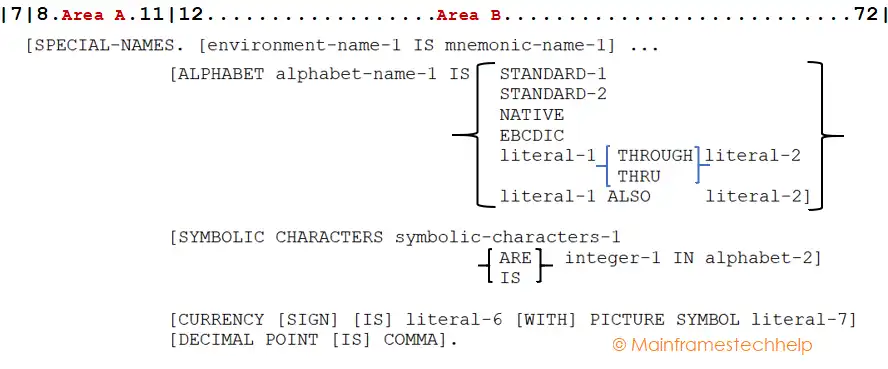COBOL CONFIGURATION SECTION
CONFIGURATION SECTION provides the computer environment information in which the program is compiled and executed. It is an optional section in the COBOL program.
Syntax -
[CONFIGURATION SECTION.
[SOURCE-COMPUTER. computer-name]
[OBJECT-COMPUTER. computer-name]
[SPECIAL-NAMES. names-entry]]SOURCE-COMPUTER. {source-computer-entry} -
SOURCE-COMPUTER provides the computer name on which the source program is compiled.

- computer-name - Source computer name where the program is coded.
- WITH DEBUGGING MODE - Activates a compile-time debugging switch for debugging lines coded in the program.
Debugging Lines -
- A debugging line is a code with a "D" in column 7.
- Debugging lines are allowed to code in the ENVIRONMENT DIVISION, DATA DIVISION, and PROCEDURE DIVISION.
- If the DEBUGGING MODE is coded, the code with "D" in the 7th column is considered as code.
- If the DEBUGGING MODE is not coded, the code with "D" in the 7th column is treated as comments.
Practical Example -
Scenario1 - Example to describe how the DEBUGGING MODE is enabled in COBOL programming.
Code -
----+----1----+----2----+----3----+----4----+----5----+
...
ENVIRONMENT DIVISION.
CONFIGURATION SECTION.
SOURCE-COMPUTER. IBM3278 WITH DEBUGGING MODE.
OBJECT-COMPUTER. IBM3278.
PROCEDURE DIVISION.
D DISPLAY "DISPLAYING DEBUGGING LINE".
DISPLAY "DISPLAYING NORMAL LINE".
...Output -
DISPLAYING DEBUGGING LINE DISPLAYING NORMAL LINE
Explaining Example -
DEBUGGING MODE is coded on SOURCE-COMPUTER. Thus, all the debugging lines in the program are considered as code during the compilation and executed when we ran the program.
Scenario2 - Example to describe how the DEBUGGING MODE is disabled in COBOL programming.
Code -
----+----1----+----2----+----3----+----4----+----5----+
...
ENVIRONMENT DIVISION.
CONFIGURATION SECTION.
SOURCE-COMPUTER. IBM3278.
OBJECT-COMPUTER. IBM3278.
PROCEDURE DIVISION.
D DISPLAY "DISPLAYING DEBUGGING LINE".
DISPLAY "DISPLAYING NORMAL LINE".
...Output -
DISPLAYING NORMAL LINE
Explaining Example -
DEBUGGING MODE not coded with SOURCE-COMPUTER. i.e., DEBUGGING MODE disabled. All the debugging lines are considered comments during the compilation and not executed when we ran the program.
OBJECT-COMPUTER. {object-computer-entry} -
OBJECT-COMPUTER paragraph specifies the system name where the object code will be executed.

- Computer-name - Specifies where the program is executed. If it is coded, the program runs only on specified machine and doesn't run on the current machine.
- PROGRAM COLLATING SEQUENCE IS alphabet-name - A collating sequence is used to overwrite the system collating sequence. The alphabet-name should be defined in the SPECIAL-NAMES paragraph to specify the collating sequence.
SPECIAL-NAMES. {special-names-entry} -
SPECIAL-NAMES paragraph overrides system-defined objects like environment names, user-defined mnemonic names, collating sequences, class names, currency strings, commas, and decimal points.

- environment-name-1 - specifies the system name where the compiler took the actions.
- mnemonic-name-1 - user-defined name.
- ALPHABET clause - Declares a name with a character code or collating sequence.
For example -
SPECIAL-NAMES. ALPHABET ALPHA-NAME IS EBCDIC. - SYMBOLIC CHARACTERS clause - Applies a variable to single-byte character sets. Each character represented is an alphanumeric character.
For example -
SPECIAL-NAMES. SYMBOLIC CHARACTERS SC-A IS 97.
- CURRENCY SIGN clause - sets the currency symbol in a PICTURE clause.
For example -
SPECIAL-NAMES. CURRENCY SIGN IS "$". - DECIMAL-POINT IS COMMA clause - swaps the functions of the period. Also, change the comma in PICTURE character-strings and numeric literals.
For example -
SPECIAL-NAMES. DECIMAL-POINT IS COMMA.
Practical Example -
Scenario - Example to describe how the PROGRAM COLLATING SEQUENCE is used in COBOL programming.
Code -
----+----1----+----2----+----3----+----4----+----5----+
...
ENVIRONMENT DIVISION.
CONFIGURATION SECTION.
SOURCE-COMPUTER. IBM3278.
OBJECT-COMPUTER. IBM3278
PROGRAM COLLATING SEQUENCE IS TEST-COLLATE.
SPECIAL-NAMES. ALPHABET TEST-COLLATE IS 'STUVWXY'.
DATA DIVISION.
WORKING-STORAGE SECTION.
01 WS-VAR PIC X(01).
PROCEDURE DIVISION.
MOVE LOW-VALUE TO WS-VAR.
DISPLAY "LOWEST VALUE IS: " WS-VAR.
...Output -
LOWEST VALUE IS: S
Explaining Example -
TEST COLLATE is the PROGRAM COLLATING SEQUENCE that overrides the ALPHABET system collating sequence. i.e., the EBCDIC character sequence has been overridden by the 'STUVWXY'. Therefore, the LOW-VALUE is 'S,' and the same is displayed in the output.
